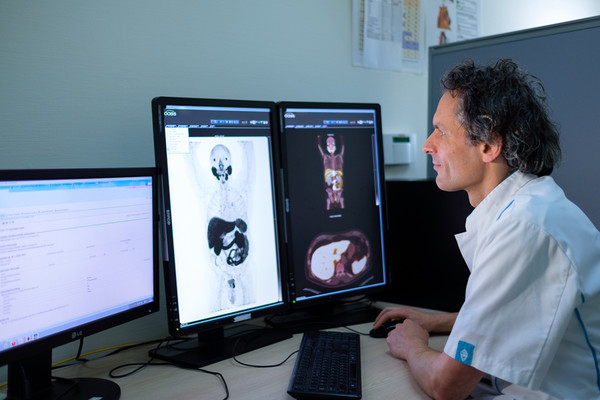The PINCH study
The PINCH study is designed to investigate PD-L1 PET-imaging, a new technique to predict response to immune therapy in patients with recurrent or metastatic head and neck cancer. This technique potentially visualises tumor cells expressing the protein PD-L1. The number of visualised tumor cells will be correlated to the treatment response with durvalumab.
Head and neck cancer is the sixth most common cancer worldwide, with an overall survival rate of 65% after 5 years. In attempts to improve survival, immune therapies targeting PD-L1 have been studied extensively, resulting in impressive and durable antitumor responses. However, only 15-20% of patients respond to these drugs. This means that non-responders are exposed to expensive, ineffective treatment, and its associated side effects, while alternative treatment is delayed. Therefore, there is an urgent need for a predictive biomarker to select patients who could benefit from immune therapy.
Patients with recurrent or metastatic head and neck cancer will be approached to participate in the PINCH study, offering one PD-L1 PET scan before treatment with the anti PD-L1 checkpoint inhibitor durvalumab. The PD-L1 PET scan can visualise tumor cells that express a protein referred to as PD-L1. Based on previous studies, the presence of tumor cells expressing PD-L1 can predict the response to treatment. Currently, the presence of PD-L1 is analysed on a sample of tumor tissue. This sample does not reflect the presence of PD-L1 on all tumor cells, therefore this can lead to misinterpretation. PD-L1 PET-imaging can overcome these limitations. It visualises PD-L1 positive tumor cells throughout the whole body with a high specificity, avoiding sampling errors and misinterpretation.
When the number of PD-L1 positive tumor cells correlate with the response to durvalumab treatment, this project shows the potential value of PD-L1 PET-imaging as a predictor for treatment with immune checkpoint inhibitors and a prospective trial is a potential follow-up.



